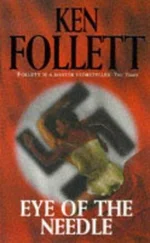Ken Follett - Winter of the World (Century Trilogy 2)
Здесь есть возможность читать онлайн «Ken Follett - Winter of the World (Century Trilogy 2)» весь текст электронной книги совершенно бесплатно (целиком полную версию без сокращений). В некоторых случаях можно слушать аудио, скачать через торрент в формате fb2 и присутствует краткое содержание. Жанр: Старинная литература, на английском языке. Описание произведения, (предисловие) а так же отзывы посетителей доступны на портале библиотеки ЛибКат.
- Название:Winter of the World (Century Trilogy 2)
- Автор:
- Жанр:
- Год:неизвестен
- ISBN:нет данных
- Рейтинг книги:5 / 5. Голосов: 2
-
Избранное:Добавить в избранное
- Отзывы:
-
Ваша оценка:
- 100
- 1
- 2
- 3
- 4
- 5
Winter of the World (Century Trilogy 2): краткое содержание, описание и аннотация
Предлагаем к чтению аннотацию, описание, краткое содержание или предисловие (зависит от того, что написал сам автор книги «Winter of the World (Century Trilogy 2)»). Если вы не нашли необходимую информацию о книге — напишите в комментариях, мы постараемся отыскать её.
Winter of the World (Century Trilogy 2) — читать онлайн бесплатно полную книгу (весь текст) целиком
Ниже представлен текст книги, разбитый по страницам. Система сохранения места последней прочитанной страницы, позволяет с удобством читать онлайн бесплатно книгу «Winter of the World (Century Trilogy 2)», без необходимости каждый раз заново искать на чём Вы остановились. Поставьте закладку, и сможете в любой момент перейти на страницу, на которой закончили чтение.
Интервал:
Закладка:
‘So did Volodya – he told me.’
Bicks thumped his desk in excitement. ‘School friends! That’s it! We’ve got the bastard!’
‘It’s not proof,’ said Greg.
‘Oh, don’t worry, he’ll confess.’
‘How can you be sure?’
‘Those scientists believe that knowledge should be shared with everyone, not kept secret. He’ll try to justify himself by arguing that he did it for the good of humanity.’
‘Maybe he did.’
‘He’ll go to the electric chair all the same,’ said Bicks.
Greg was suddenly chilled. Willi Frunze had seemed a nice guy. ‘Will he?’
‘You bet your ass. He’s going to fry.’
Bicks was right. Willi Frunze was found guilty of treason and sentenced to death, and he died in the electric chair.
So did his wife.
(iii)
Daisy watched her husband tie his white bow tie and slip into the tailcoat of his perfectly fitting dress suit. ‘You look like a million dollars,’ she said, and she meant it. He should have been a movie star.
She remembered him thirteen years earlier, wearing borrowed clothes at the Trinity Ball, and she felt a pleasant frisson of nostalgia. He had looked pretty good then, she recalled, even though his suit was two sizes too big.
They were staying in her father’s permanent suite at the Ritz-Carlton hotel in Washington. Lloyd was now a junior minister in the British Foreign Office, and he had come here on a diplomatic visit. Lloyd’s parents, Ethel and Bernie, were thrilled to be looking after two grandchildren for a week.
Tonight Daisy and Lloyd were going to a ball at the White House.
She was wearing a drop-dead dress by Christian Dior, pink satin with a dramatically spreading skirt made of endless folds of flaring tulle. After the years of wartime austerity she was delighted to be able to buy gowns in Paris again.
She thought of the Yacht Club Ball of 1935 in Buffalo, the event that she imagined, at the time, had ruined her life. The White House was obviously a lot more prestigious, but she knew that nothing that happened tonight could ruin her life. She reflected on that while Lloyd helped her put on her mother’s necklace of rose-coloured diamonds with matching earrings. At the age of nineteen she had desperately wanted high-status people to accept her. Now she could hardly imagine worrying about such a thing. As long as Lloyd said she looked fabulous, she did not care what anyone else thought. The only other person whose approval she might seek was her mother-in-law, Eth Leckwith, who had little social status and had certainly never worn a Paris gown.
Did every woman look back and think how foolish she had been when young? Daisy thought again about Ethel, who had certainly behaved foolishly – getting pregnant by her married employer – but never spoke regretfully about it. Maybe that was the right attitude. Daisy contemplated her own mistakes: becoming engaged to Charlie Farquharson, rejecting Lloyd, marrying Boy Fitzherbert. She was not quite able to look back and think about the good that had come of those choices. It was really not until she had been decisively rejected by high society, and had found consolation at Ethel’s kitchen in Aldgate, that her life had taken a turn for the better. She had stopped yearning for social status and had learned what real friendship was, and she had been happy ever since.
Now that she no longer cared, she enjoyed parties even more.
‘Ready?’ said Lloyd.
She was ready. She put on the matching evening coat that Dior had made to go with the dress. They went down in the elevator, left the hotel, and stepped into the waiting limousine.
(iv)
Carla persuaded her mother to play the piano on Christmas Eve.
Maud had not played for years. Perhaps it saddened her by bringing back memories of Walter: they had always played and sung together, and she had often told the children how she had tried, and failed, to teach him to play ragtime. But she no longer told that story, and Carla suspected that nowadays the piano made Maud think of Joachim Koch, the young officer who had come to her for piano lessons, whom she had deceived and seduced, and whom Carla and Ada had killed in the kitchen. Carla herself was not able to shut out the recollection of that nightmare evening, especially getting rid of the body. She did not regret it – they had done the right thing – but, all the same, she would have preferred to forget it.
However, Maud at last agreed to play ‘Silent Night’ for them all to sing along. Werner, Ada, Erik, and the three children, Rebecca, Walli, and the new baby, Lili, gathered around the old Steinway in the drawing room. Carla put a candle on the piano, and studied the faces of her family in its moving shadows as they sang the familiar German carol.
Walli, in Werner’s arms, would be four years old in a few weeks’ time, and he tried to sing along, alertly guessing the words and the melody. He had the Oriental eyes of his rapist father: Carla had decided that her revenge would be to raise a son who treated women with tenderness and respect.
Erik sang the words of the hymn sincerely. He supported the Soviet regime as blindly as he had supported the Nazis. Carla had at first been baffled and infuriated, but now she saw a sad logic to it. Erik was one of those inadequate people who were so scared by life that they preferred to live under harsh authority, to be told what to do and what to think by a government that allowed no dissent. They were foolish and dangerous, but there were an awful lot of them.
Carla gazed fondly at her husband, still handsome at thirty. She recalled kissing him, and more, in the front of his sexy car, parked in the Grunewald, when she was nineteen. She still liked kissing him.
When she thought over the time that had passed since then, she had a thousand regrets, but the biggest was her father’s death. She missed him constantly and still cried when she remembered him lying in the hall, beaten so cruelly that he did not live until the doctor arrived.
But everyone had to die, and Father had given his life for the sake of a better world. If more Germans had had his courage the Nazis would not have triumphed. She wanted to do all the things he had done: to raise her children well, to make a difference to her country’s politics, to love and be loved. Most of all, when she died, she wanted her children to be able to say, as she said of her father, that her life had meant something, and that the world was a better place for it.
The carol came to an end; Maud held the final chord; and little Walli leaned forward and blew the candle out.
ACKNOWLEDGEMENTS
My principal history advisor for The Century Trilogy is Richard Overy. I am grateful also to historians Evan Mawdsley, Tim Rees, Matthias Reiss and Richard Toye for reading the typescript of Winter of the World and making corrections.
As always I had invaluable help from my editors and agents, especially Amy Berkower, Leslie Gelbman, Phyllis Grann, Neil Nyren, Susan Opie and Jeremy Trevathan.
I met my agent Al Zuckerman in about 1975 and he has been my most critical and inspiring reader ever since.
Several friends made helpful comments. Nigel Dean has an eye for detail like no one else. Chris Manners and Tony McWalter were as sharply perceptive as ever. Angela Spizig and Annemarie Behnke saved me from numerous errors in the German sections.
We always thank our families, and so we should. Barbara Follett, Emanuele Follett, Jann Turner, and Kim Turner read the first draft and made useful criticisms, as well as giving me the matchless gift of their love.
Also by Ken Follett
The Modigliani Scandal
Paper Money
Eye of the Needle
Triplee
Читать дальшеИнтервал:
Закладка:
Похожие книги на «Winter of the World (Century Trilogy 2)»
Представляем Вашему вниманию похожие книги на «Winter of the World (Century Trilogy 2)» списком для выбора. Мы отобрали схожую по названию и смыслу литературу в надежде предоставить читателям больше вариантов отыскать новые, интересные, ещё непрочитанные произведения.
Обсуждение, отзывы о книге «Winter of the World (Century Trilogy 2)» и просто собственные мнения читателей. Оставьте ваши комментарии, напишите, что Вы думаете о произведении, его смысле или главных героях. Укажите что конкретно понравилось, а что нет, и почему Вы так считаете.












